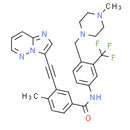Description
Ponatinib is an orally bioavailable multitargeted receptor tyrosine kinase (RTK) inhibitor with potential antiangiogenic and antineoplastic activities. Multitargeted tyrosine kinase inhibitor AP24534 inhibits unmutated and all mutated forms of Bcr-Abl, including T315I, the highly drug therapy-resistant missense mutation of Bcr-Abl. This agent also inhibits other tyrosine kinases including those associated with vascular endothelial growth factor receptors (VEGFRs) and fibroblast growth factor receptors (FGFRs); in addition, it inhibits the tyrosine kinase receptor TIE2 and FMS-related tyrosine kinase receptor-3 (Flt3).
Product information
CAS Number: 943319-70-8
Molecular Weight: 532.56
Formula: C29H27F3N6O
Synonym:
AP-24534
AP 24534
Iclusig
Ponatinib
Chemical Name: 3-(imidazo[1,2-b]pyridazin-3-ylethynyl)-4-methyl-N-(4-((4-methylpiperazin-1-yl)methyl)-3-(trifluoromethyl)phenyl)benzamide.
Smiles: CN1CCN(CC2=CC=C(C=C2C(F)(F)F)NC(=O)C2=CC=C(C)C(=C2)C#CC2=CN=C3C=CC=NN23)CC1
InChiKey: PHXJVRSECIGDHY-UHFFFAOYSA-N
InChi: InChI=1S/C29H27F3N6O/c1-20-5-6-22(16-21(20)8-10-25-18-33-27-4-3-11-34-38(25)27)28(39)35-24-9-7-23(26(17-24)29(30,31)32)19-37-14-12-36(2)13-15-37/h3-7,9,11,16-18H,12-15,19H2,1-2H3,(H,35,39)
Technical Data
Appearance: Solid Power.
Purity: ≥98% (or refer to the Certificate of Analysis)
Solubility: DMSO: 30 mg/mL(56.33 mM).
Shipping Condition: Shipped under ambient temperature as non-hazardous chemical or refer to Certificate of Analysis
Storage Condition: Dry, dark and -20 oC for 1 year or refer to the Certificate of Analysis.
Shelf Life: ≥12 months if stored properly.
Stock Solution Storage: 0 - 4 oC for 1 month or refer to the Certificate of Analysis.
Drug Formulation: To be determined.
HS Tariff Code: 382200
How to use
In Vitro:
Ponatinib (AP24534) potently inhibits native ABL (IC50: 0.37 nM), ABLT315I (IC50: 2.0 nM), and other clinically important ABL kinase domain mutants (IC50: 0.30-0.44 nM). Ponatinib also inhibits SRC (IC50: 5.4 nM) and members of the VEGFR, FGFR, and PDGFR families of receptor tyrosine kinases. Ponatinib potently inhibits proliferation of Ba/F3 cells expressing native BCR-ABL (IC50: 0.5 nM). All BCR-ABL mutants tested remained sensitive to Ponatinib (IC50: 0.5-36 nM) including BCR-ABLT315I (IC50: 11 nM). Ponatinib inhibits the in vitro kinase activity of FLT3, KIT, FGFR1, and PDGFRα with IC50 values of 13, 13, 2, and 1 nM, respectively. Ponatinib inhibits phosphorylation of all 4 RTKs in a dose-dependent manner, with IC50 values between 0.3 to 20 nM. Consistent with these activated receptors being important in driving leukemogenesis Ponatinib also potently inhibits the viability of all 4 cell lines with IC50 values of 0.5 to 17 nM. In contrast, the IC50 for inhibition of RS4;11 cells which express native (unmutated) FLT3, is more than 100 nM.
In Vivo:
In a survival model in which mice are instead injected with Ba/F3 BCR-ABLT315I cells, administration of Dasatinib at doses as high as 300 mg/kg has no effect on survival time. By contrast, treatment with Ponatinib (AP24534) prolongs survival in a dose-dependent manner. Ponatinib dosed orally for 19 days at 5, 15, and 25 mg/kg prolongs median survival to 19.5, 26, and 30 days, respectively compare to 16 days for vehicle-treated mice (p<0.01 for all three dose levels). The anti-tumor activity of Ponatinib (AP24534) is further assessed in a xenograft model in which Ba/F3 BCR-ABLT315I cells are injected subcutaneously into mice. Tumor growth is inhibited by Ponatinib in a dose-dependent manner compare to vehicle-treated mice, with significant suppression of tumor growth upon daily oral dosing at 10 and 30 mg/kg (%T/C = 68% and 20%, respectively; p<0.01 for both dose levels). Daily oral dosing of 50 mg/kg Ponatinib causes significant tumor regression (%T/C = 0.9%, p<0.01), with a 96% reduction in mean tumor volume at the final measurement compared to the start of treatment. Ponatinib is well tolerated at all efficacious dose levels for the duration of the study; maximal decreases in body weight are <5%, <5%, and <12% for the 10, 30, and 50 mg/kg dose groups, respectively, with no signs of overt toxicity. Ponatinib (1-25 mg/kg) is administered orally, once daily for 28 days, to mice bearing MV4-11 xenografts. Ponatinib potently inhibits tumor growth in a dose-dependent manner. Administration of 1 mg/kg, the lowest dose tested, leads to significant inhibition of tumor growth (TGI=46%, P<0.01) and doses of 2.5 mg/kg or greater results in tumor regression.
References:
- Oaxaca DM, Yang-Reid SA, Ross JA, Rodriguez G, Staniswalis JG, Kirken RA. Sensitivity of imatinib-resistant T315I BCR-ABL CML to a synergistic combination of ponatinib and forskolin treatment. Tumour Biol. 2016 Jul 21. [Epub ahead of print] PubMed PMID: 27444277.
- Abid MB, De Mel S. Does ponatinib cross the blood-brain barrier? Br J Haematol. 2016 Jun 28. doi: 10.1111/bjh.14222. [Epub ahead of print] PubMed PMID: 27352067.
- Engel NW, Constantin A, Fowlkes S, Assouline S. Unexpected Success of Watch and Wait Strategy in a Ponatinib-Intolerant Patient With Chronic Myeloid Leukemia. J Oncol Pract. 2016 Jun;12(6):592-4. doi: 10.1200/JOP.2016.012054. Epub 2016 May 31. PubMed PMID: 27246687.
Products are for research use only. Not for human use.
Payment & Security
Your payment information is processed securely. We do not store credit card details nor have access to your credit card information.


